The most accurate size recommendation tool, available on Shopify App Store.
Offer your customers the precise fit they deserve in a hassle-free way.
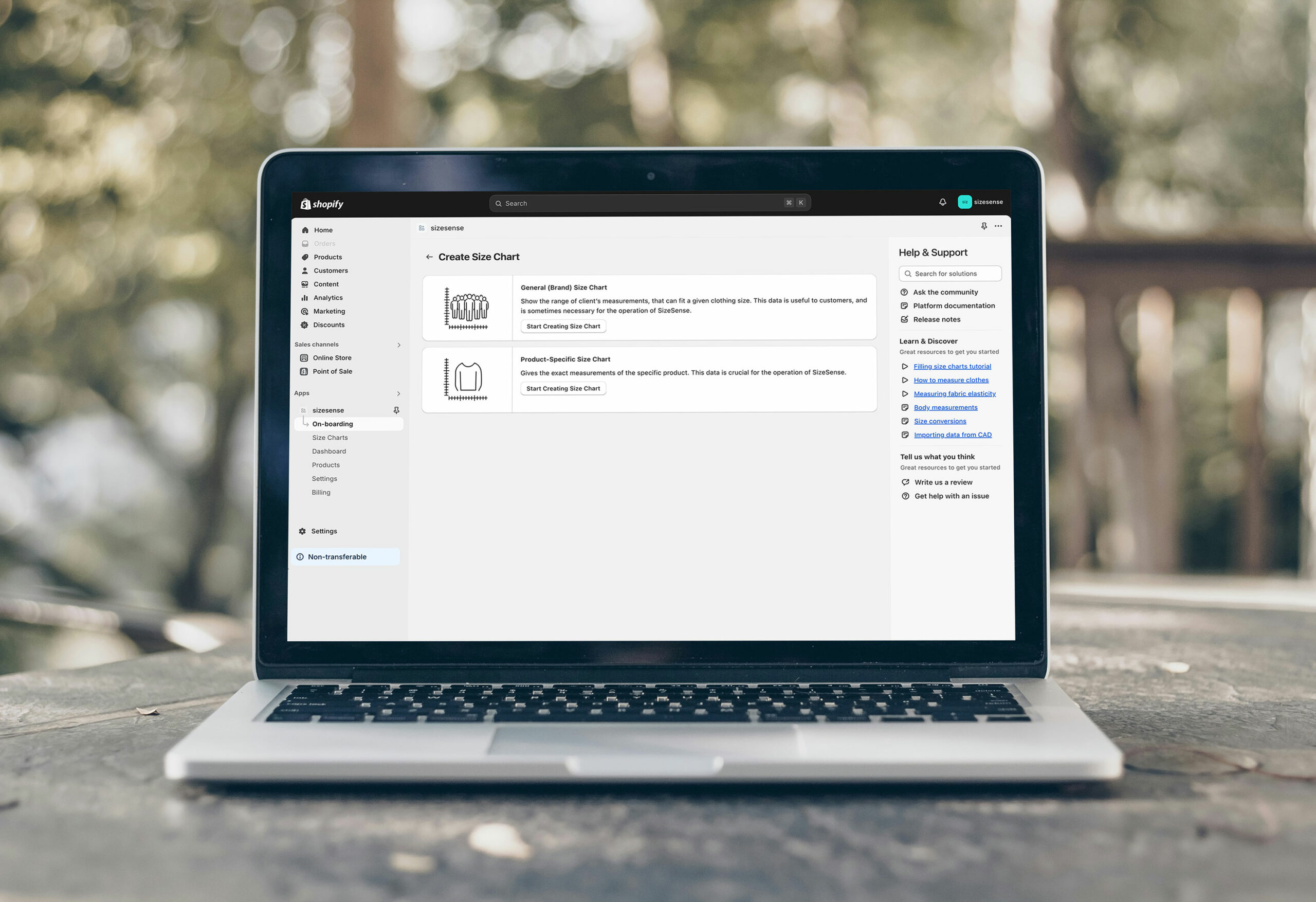
52%
of customer returns
occur due to sizing issues
60%
of online shoppers hesitate
to make a purchase
due to sizing uncertainties.
Now that is painful data…
Finding the perfect clothing size is a daunting task when shopping online.
When in doubt about the size and fit, customers resort to:
Each of these costs your business money and time. You also lose out on deepening your customer relationships and elevating your brand value.
Choose the best-in-class size recommendation tool
The brainchild of an experienced fashion designer/patternmaker and an AI assistant professor. Our algorithms are the result of crafting hundreds of made-to-measure garments. They achieve precise and personalized fit for every individual.
Easy to use customizable front-facing part
Simple questions
The tool gathers essential information by asking customers for their bust, waist, and hip measurements and their wear preferences, ensuring precise data collection with minimal effort.
Seamless Recommendations Across Every Product
After entering their personal information once, customers will receive size recommendations on every product page they visit, ensuring a smooth and effortless shopping experience.
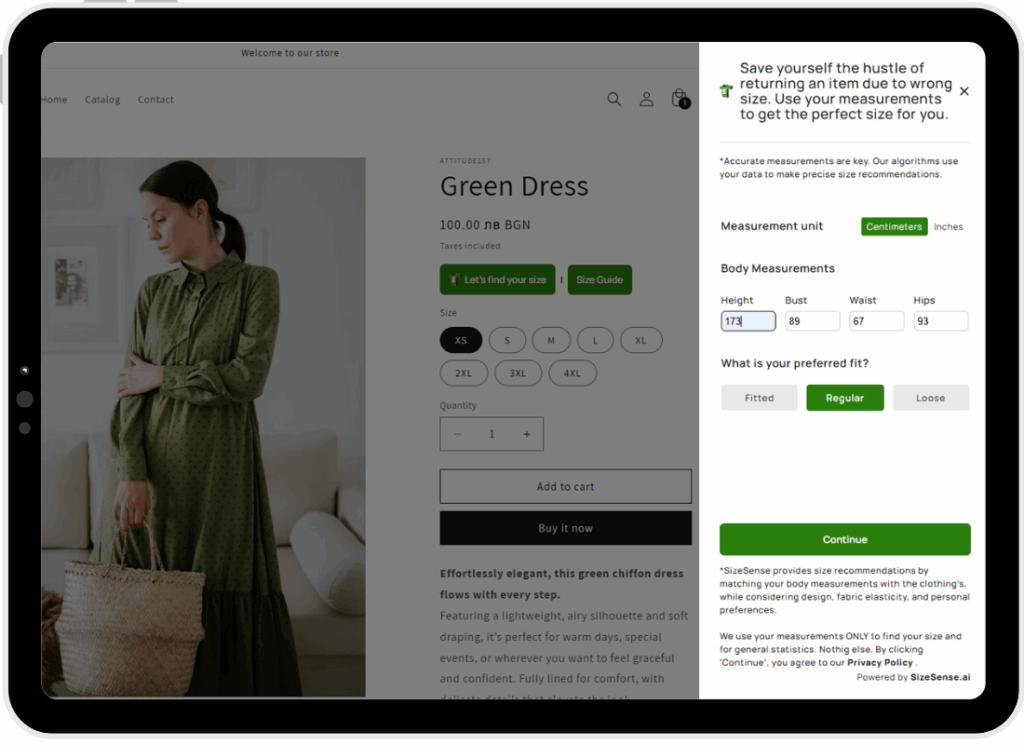
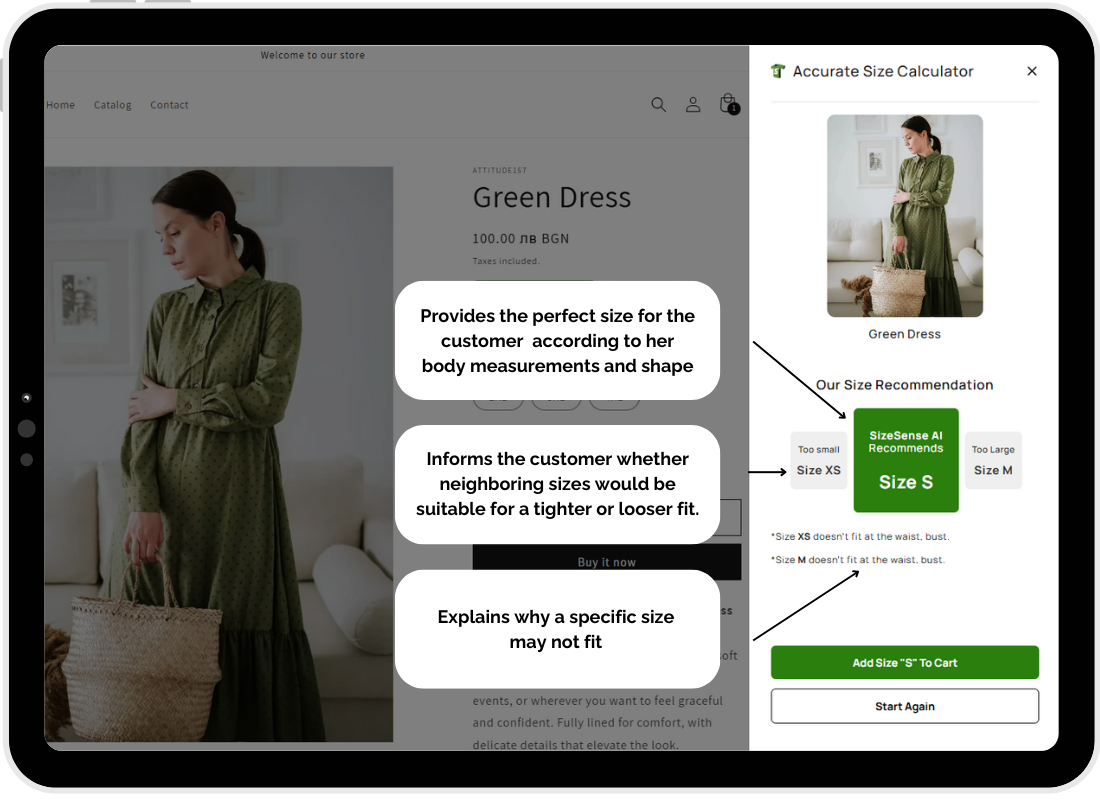
Proprietary algorithms for 94% accurate size recommendations
1:1 Alignment
We align customer body measurements with the specific measurements of each garment your customer considers, ensuring a precise and personalized fit.
Considers Body Shape and Customer Wear Preferences
Our algorithms take into account not only the basic measurements but also the unique body shape and personal fit preferences of each customer.
Considers elasticity and clothing design
By recognizing the impact of fabric elasticity and the design of the clothing, our tool provides accurate recommendations that traditional methods often miss.
Customizable Size Charts That Match Your Brand
Display product-specific size charts directly next to your products – fully aligned with your garment specs and brand style. With SizeSense, you’re in control:
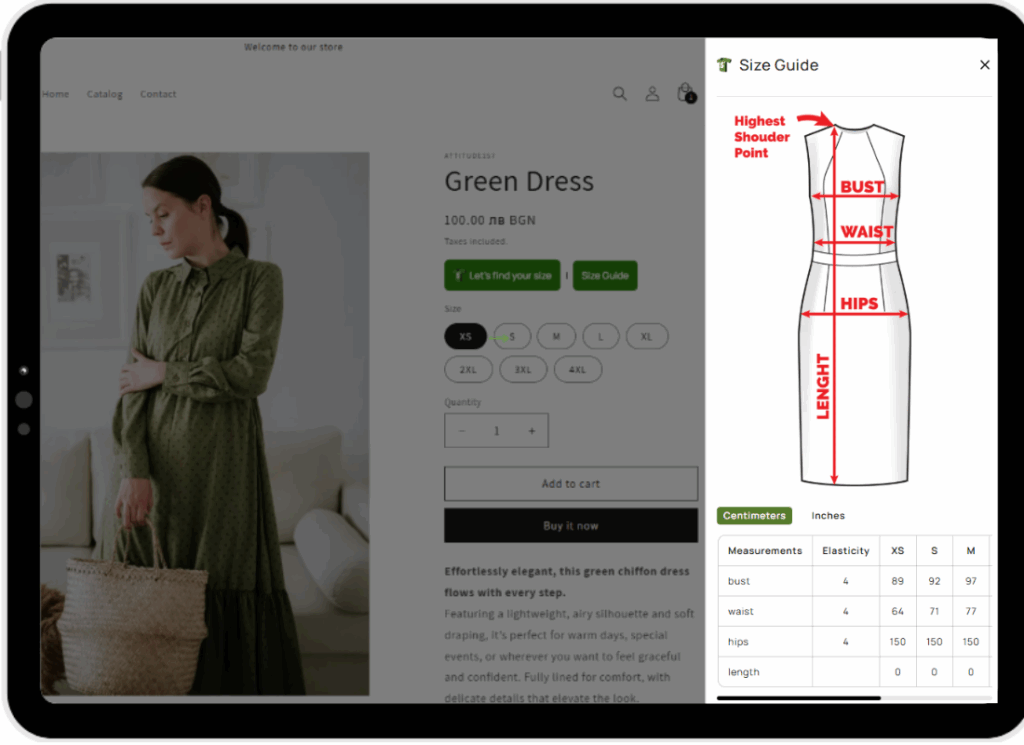
Intuitive back-office
Effortless Product Uploads
Our system automatically uploads your products from your Shopify store, streamlining the setup process and ensuring your inventory is always up to date.
When creating size charts for your products, be sure to return here and assign both a General (brand) size guide and a Product-specific size chart to each item.
To enable size recommendations on your storefront, ensure the recommendation algorithms are activated for every product. You can manage this in the last column of the dashboard.
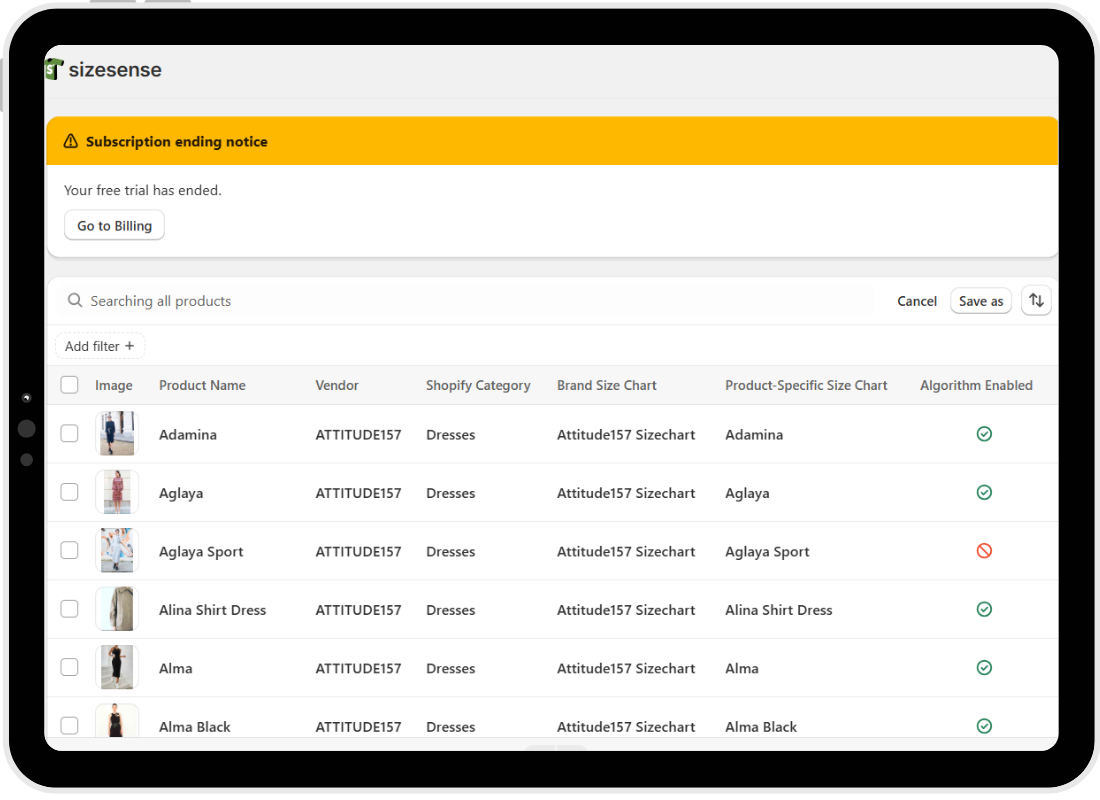
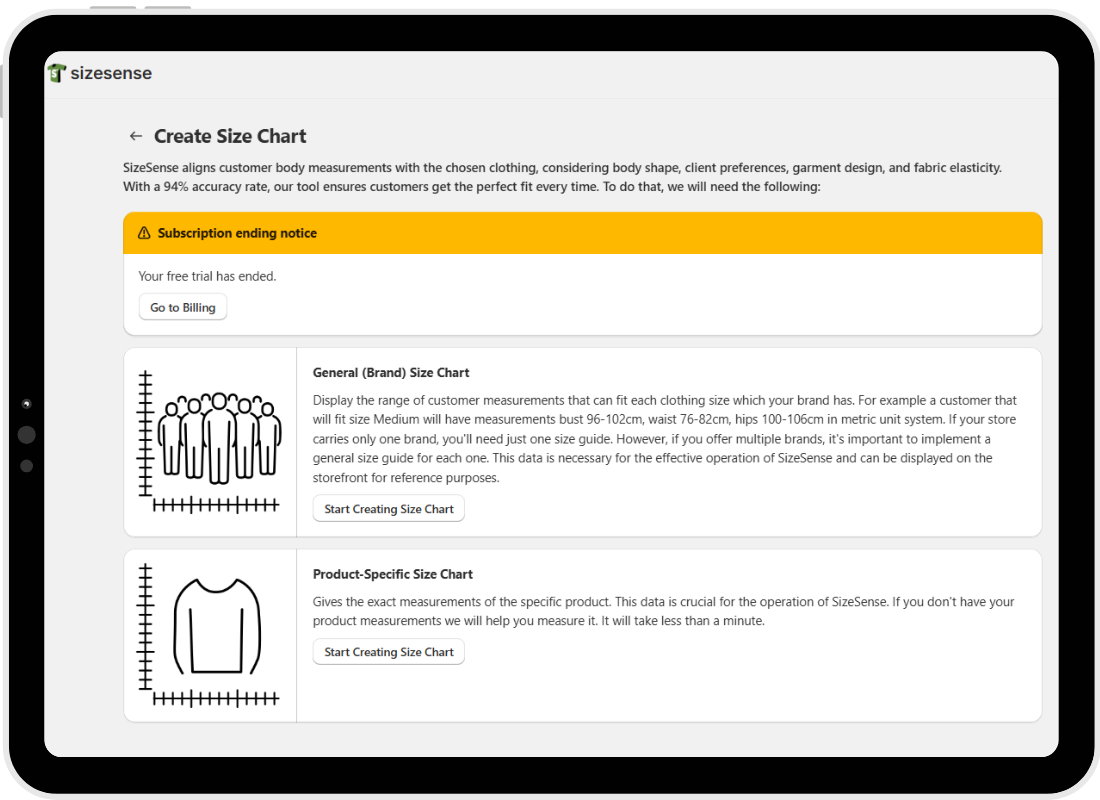
To provide accurate results, SizeSense requires two types of size charts.
Step 1: Provide General (Brand) Size Guide
The General Brand Size Guide outlines the sizes you offer and the customer measurements that correspond to each size. For example, a Medium size might fit a customer with a bust of 96-102 cm, waist of 76-82 cm, and hips of 100-106 cm.
Single Brand? You only need one general size guide.
Multiple Brands? You’ll need a separate size guide for each brand.
SizeSense uses these types of size charts as a reference to understand your target customer’s measurements.
Step 2: Provide Product-Specific Size Charts
To provide personalized size recommendations, SizeSense needs specific garment measurements. These include bust, waist, and hip measurements for dresses, outerwear, and tops – and waist and hip measurements for skirts and pants. These are the mandatory measurements which SizeSense will need to provide your customers with accurate size recommendations.
You can create both types of size charts manually or easily import them!
Create or import your General Size Guide
Customize size names, add or remove sizes, define precise measurement ranges, and choose your preferred units (cm or inches). Assign the chart to a specific brand and save it with a clear, recognizable name.
Your general size chart should include measurement ranges. For example, for size Medium bust 96-102cm, waist 76-82cm, and hips 100-106cm.
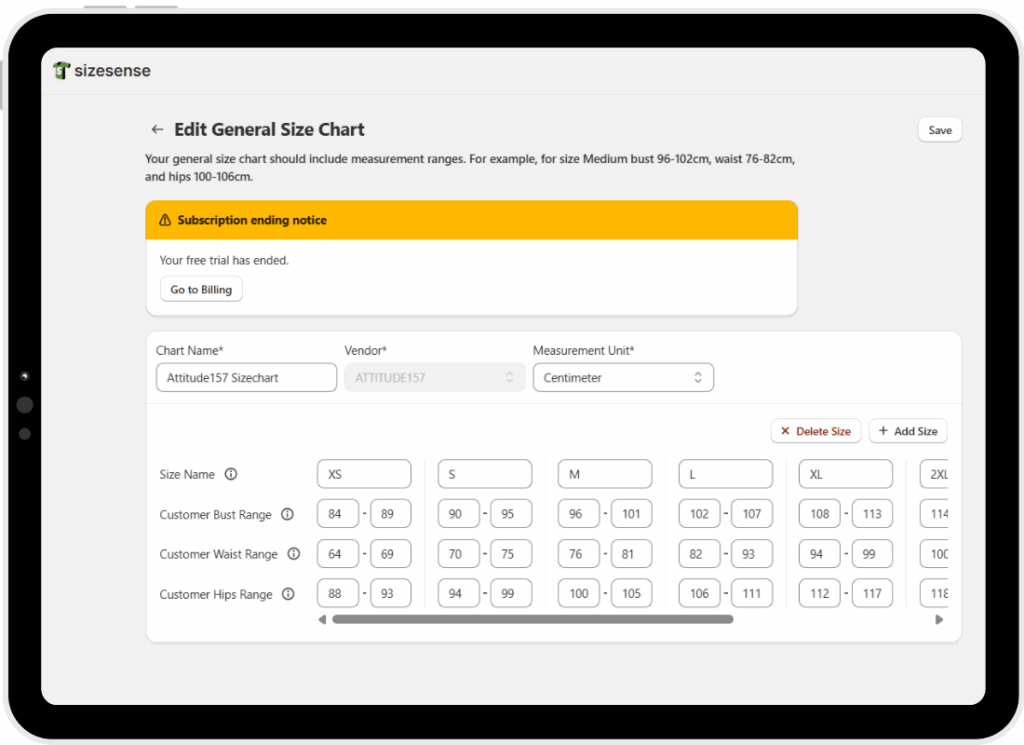
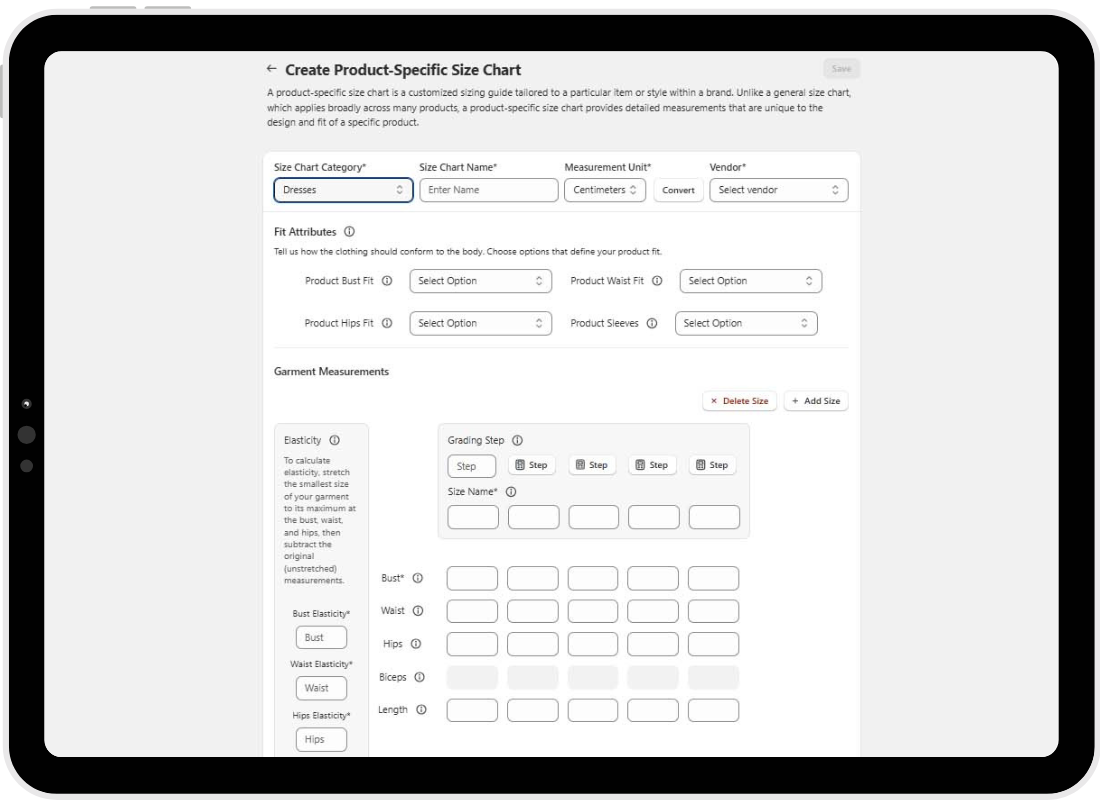
Create or import your General Size Guide
Select the correct product category – Dresses, Tops, Bottoms, or Outerwear – so the right sizing algorithm is applied.
Choose your measurement units (cm or inches) and the correct brand/vendor.
If you’re filling out product size charts manually, you only need to measure one size of the garment – then enter the grading step, and our tool will automatically calculate the rest.
Fill in the required bust, waist, and hip measurements, with optional fields for biceps, length and inseam.
Define the intended fit by selecting an option from the dropdown for each area, and indicate whether the item has sleeves, straps, or is strapless. Add the fabric’s elasticity, then click Save to generate accurate size recommendations.
Effortless Customization
You’ll be able to explore the various settings the app offers, giving you full control to configure and style it according to your brand’s look and feel. From colors and fonts to texts, everything can be customized to fit seamlessly into your store.
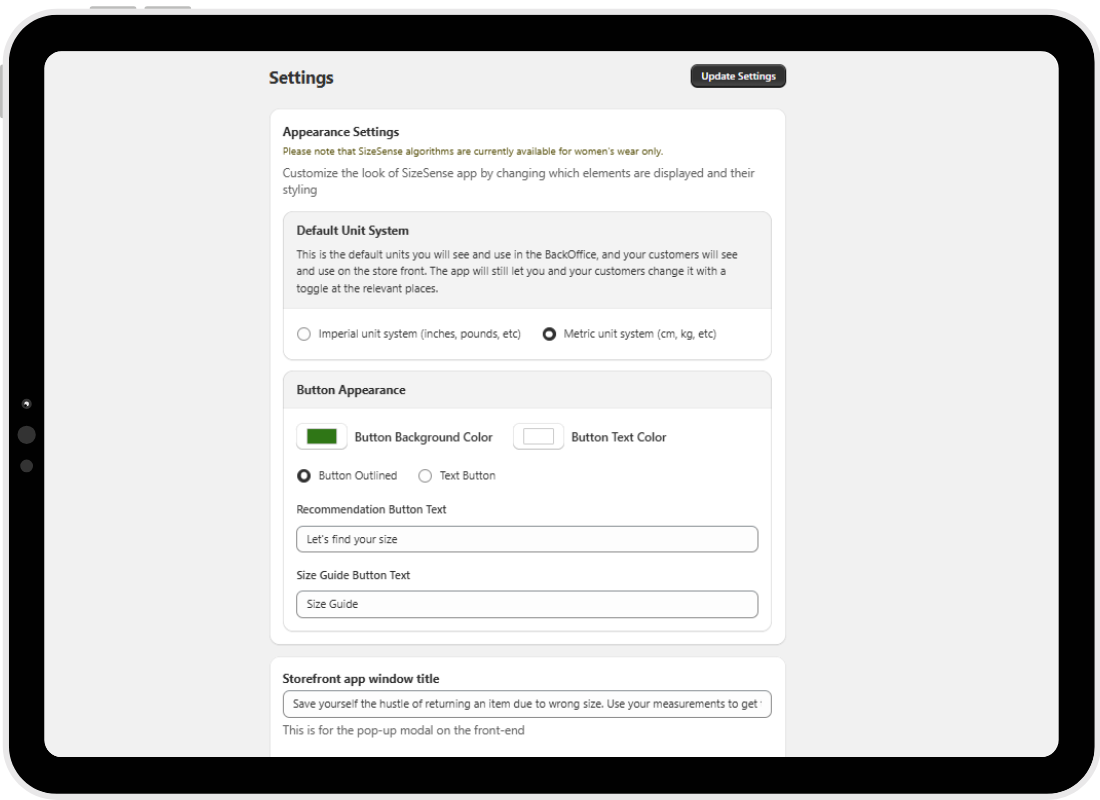
Did you know there’s a new way to:
And all this without:
All This is Possible When You Use The Right Personalized Size Recommendation Tools
Many fashion brands focus heavily on attracting new customers through marketing and social media. They often overlook the importance of retaining those customers and creating a loyal base.
Instead of fostering long-term relationships, brands often prioritize short-term sales goals. Promotions, coupon codes, or a sense of urgency (usually: highlighting limited stock). On paper, these tactics sound good – they will spur impulse purchases, driven by what we call FOMO (fear of missing out). In reality, they often lead to a fashion brand’s biggest enemy:
Higher return rates and low customer loyalty.
The reason why is quite simple, really. These purchases were not driven by genuine need, interest, or cultivated brand awareness. They were driven by emotion. Once the initial excitement fades, customers experience buyer’s remorse. Soon, returns follow, as well as the risk of diminished customer satisfaction.
Additionally, brands may not invest in personalized shopping experiences, which are crucial for making customers feel valued and understood. When customers don’t feel a connection with a brand or don’t receive a tailored experience, they are less likely to return or remain loyal.
Brands that fail to address these aspects often struggle with inconsistent sales and lower customer retention, even if their products are high-quality and they have a strong online presence.
A robust marketing strategy drives sales and growth. The best Shopify apps are those that help you achieve this with ease.
Example of a Successful Solution for Decreasing Return Rates and Building Customer Loyalty
Let me provide an example to help you understand the concept better.
The truth is that…
Most fashion brands struggle with high return rates due to the 3 main reasons why clothing does not fit:
1. Clothes might be the same size, but their pattern is different!
Clothing size depends on both the fit of the clothing and the elasticity of the fabric. People rarely take this detail into consideration when they order clothes online. This intricate combination of factors is one of the main reasons why customers see themselves jumping between different sizes all the time.
2. Clothes might be the same size, but women’s bodies are different!
Even though clothes are labeled with the same size, women’s bodies vary widely in shape and proportions. This means that a size 8 dress might fit well on one woman but be too tight or loose on another due to differences in body shape and design cuts. Inconsistent sizing standards and fabric elasticity further complicate finding the right fit. As a result, customers often struggle to find clothing that suits their unique measurements, leading to frustration and higher return rates.
3. Clothes might be the same size, but the suppliers are different!
Even when clothes are labeled with the same size, the fit can vary significantly because different suppliers use their own sizing standards and patterns. Each brand may have its own interpretation of what a “size 10” should be, leading to inconsistencies in how clothes fit. This discrepancy makes it challenging for customers to find the right size, as they cannot rely on uniform measurements across different brands. Consequently, this variability often results in confusion and frustration for shoppers trying to find clothing that fits well.
When you consider these reasons, it becomes obvious that finding the right clothing size can be a complex and frustrating experience for customers due to inconsistencies in both body shapes and sizing standards across brands. This complexity underscores the need for more reliable sizing solutions to personalize shopping experience and reduce the likelihood of returns.
How can I choose the right size recommendation tool?
Don’t install a size recommendation tool on your website if it skips these crucial factors – you could be losing both customers and sales!
Through years of experience – from creating thousands of made-to-measure garments to helping customers find the right size online – we learned what it takes to get sizing right.
When making made-to-measure clothing, there’s no room for mistakes – especially for one of the most important days in our customers’ lives.
At SizeSense.ai, we don’t claim to be revolutionary. We’ve simply transformed our patternmaking and tailoring knowledge into code – knowledge that has existed for ages – and applied it to software.
So….Don’t install a size recommendation tool on your website if it skips these crucial factors – you could be losing both customers and sales!
By addressing all these elements, SizeSense.ai ensures customers can confidently select the right size – reducing returns, increasing sales, and improving customer satisfaction.
Offer your customers the precise fit they deserve in a hassle-free way!
Take a look at our short demo
Get a FREE copy of our eBook
Boost Sales and Customer Loyalty and Decrease Returns For Your Fashion Brand!
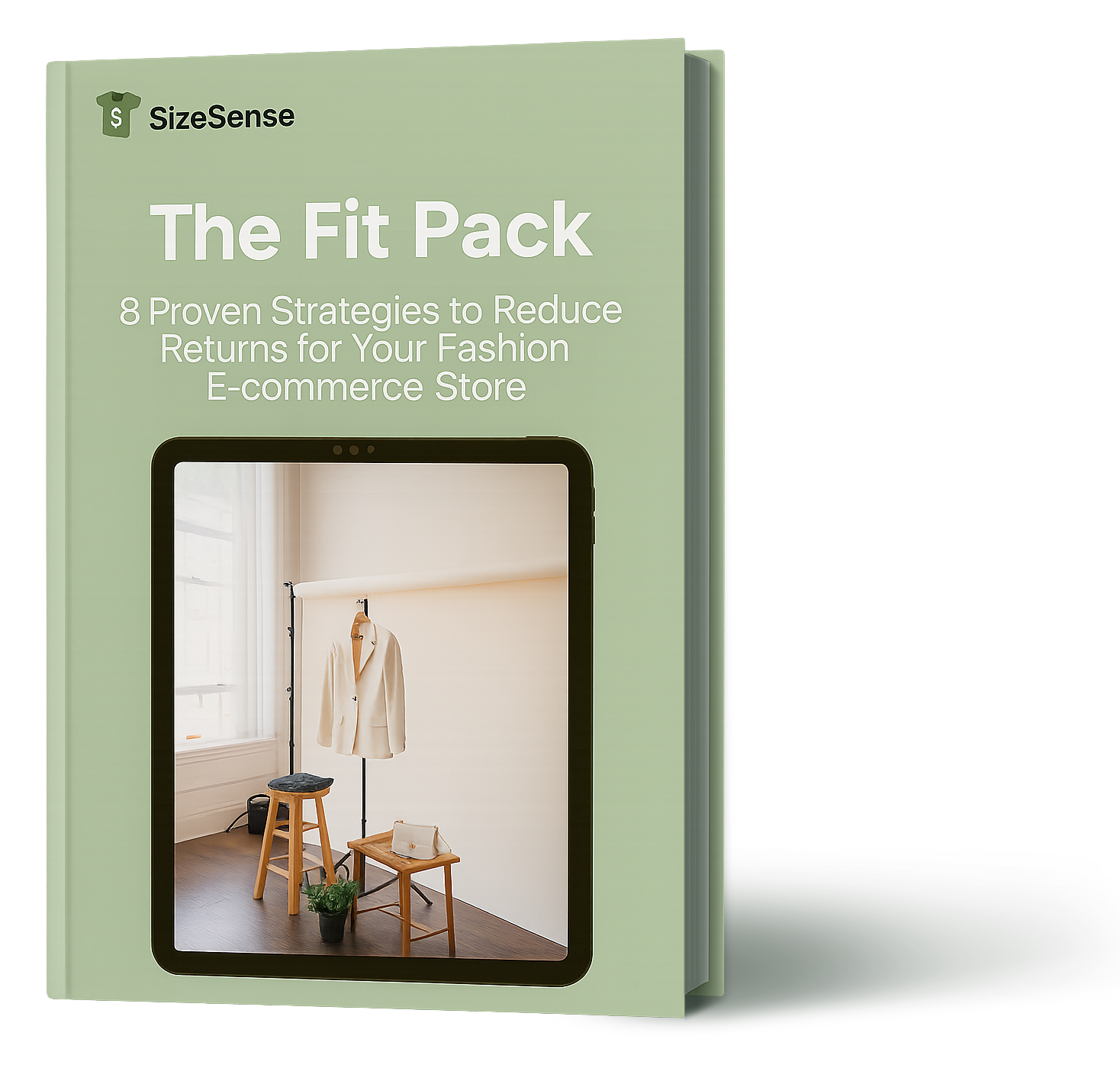
Get a free copy of our eBook. Discover how to why size Isn’t just a number, how to reduce returns and what you need to make your brand ready to use SizeSense.ai
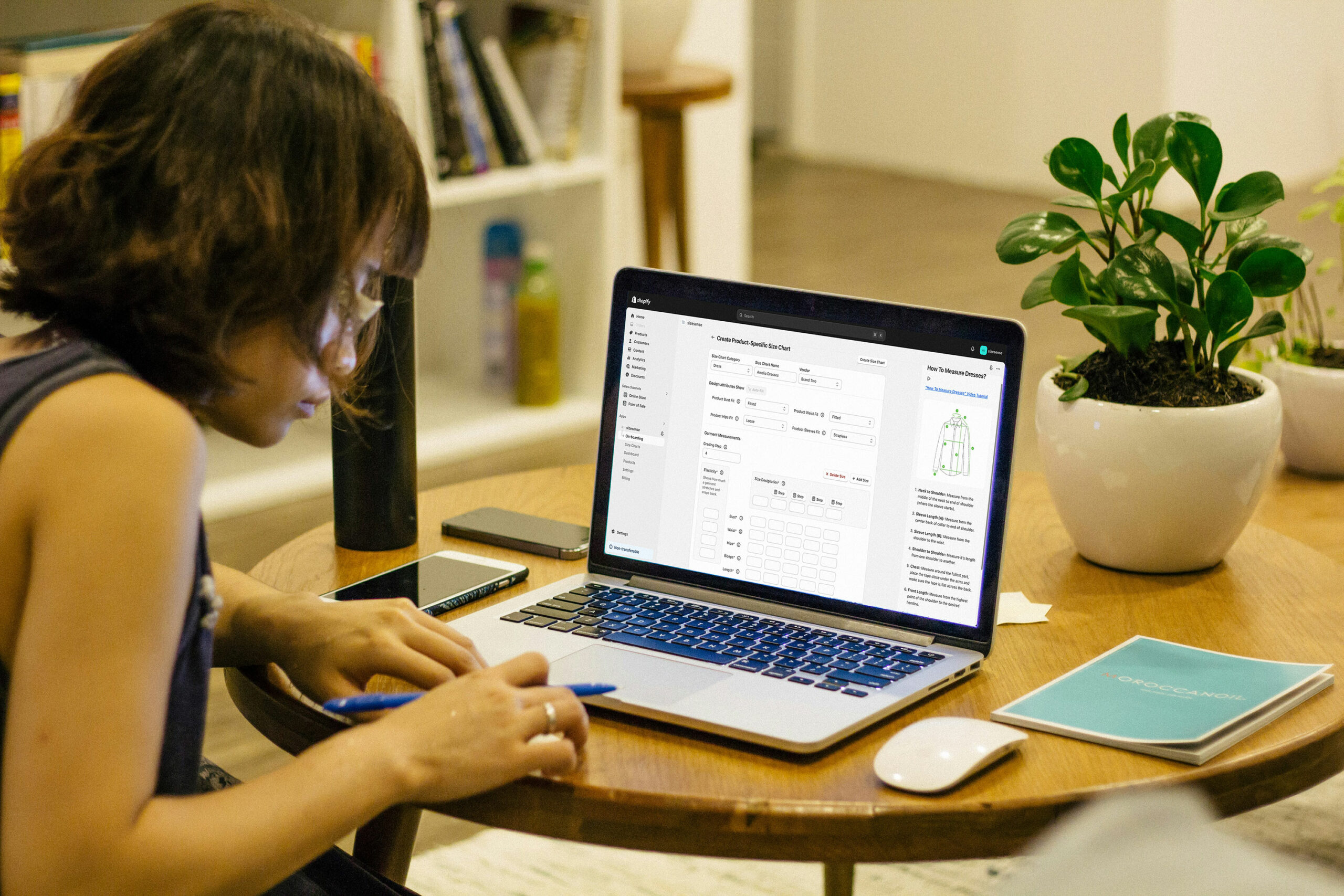
Start on a FREE plan today!
Experience the full capabilities of SizeSense without any commitment upfront. See the value and benefits of our product yourself before making a decision.
If you need help our live chat is here to help you with installing or using our product. We’ll answer any queries you might have.
Start today, in 3 easy steps!
Sign-up and install
Install our Shopify plugin and create your business account for free.
Upload size charts
Create brand (general) or product (specific) size charts using our intuitive UI. Alternatively, upload your already existing charts.
Configure appearance
Choose how the plugin behaves on your store’s front end and reap the benefits of our algorithms.
FAQs
Why do I need a size finder?
A size recommendation tool helps ensure that customers find the right fit on their first try, reducing returns due to sizing issues, decreasing abandoned carts, and ultimately boosting sales. It addresses common sizing problems that lead to customer dissatisfaction and operational inefficiencies.
Why Size Sense is the best-in-class size recommendation tool?
Size Sense is the best in class because it achieves a precise 1:1 alignment of customer body measurements with the specific clothing being considered. It takes into account not only body measurements and shape but also fabric elasticity, clothing design, and individual customer preferences, ensuring a perfect fit for every customer regardless of their figure.
What Do I Need to Get Started with SizeSense.ai?
1. Shopify Store
Currently, SizeSense is available exclusively for Shopify stores. SizeSense will soon be available for installation directly from the Shopify App Store!
We’re currently wrapping up our beta testing phase, which means the link is still unlisted for now. But don’t worry — once testing is complete, SizeSense will be fully available for everyone to install and start using!
Before installing SizeSense on your store, you should prepare
2. General Brand Size Guide
The General Brand Size Guide outlines the sizes you offer and the customer measurements that correspond to each size. For example, a Medium size might fit a customer with a bust of 96-102 cm, waist of 76-82 cm, and hips of 100-106 cm.
Single Brand? You only need one general size guide.
Multiple Brands? You’ll need a separate size guide for each brand.
SizeSense uses these types of size charts as a reference to understand your target customer’s measurements.
3. Product-Specific Size Charts
To provide personalized size recommendations, SizeSense needs specific garment measurements. These include bust, waist, and hip measurements for dresses, outerwear, and tops — and waist and hip measurements for skirts and pants. These are the mandatory measurements which SizeSense will need to provide your customers with accurate size recommendations.
You can source this data from your brand’s tech specs or manually measure the products. Don’t worry — if you need assistance, we’re here to help!
4. Fabric Elasticity
The stretch of fabrics significantly impacts fit. You will need this information for each of your products.
If you’re not sure how to measure it, here’s a quick guide:
Lay the garment flat and measure its bust width in a relaxed state.
Stretch the garment to its maximum and measure again.
Calculate the difference in width, double it, and you’ve got the elasticity measurement for that area.
Remember, if your garment is made from multiple fabrics or has an interlined waistband, you’ll need to measure elasticity in all areas where stretch might differ.
5. Get the Most Out of SizeSense
Once all the necessary data is in place, the SizeSense button will appear on your product pages, providing customers with accurate size recommendations. Even if some of your products are still missing data, SizeSense will work with the ones that are fully set up.
How Size Sense is different from other size recommendation tools?
Unlike other tools that rely on past purchase data or generic size guides, Size Sense provides highly accurate recommendations by aligning individual body measurements with specific garment measurements and accounting for fabric elasticity and design variations.
Can I use it without any technical or design background?
Yes, Size Sense is designed to be intuitive and user-friendly. The front-end is easy to use, requiring only basic customer measurements, while the back-end simplifies product management, making it accessible even without technical or design expertise.